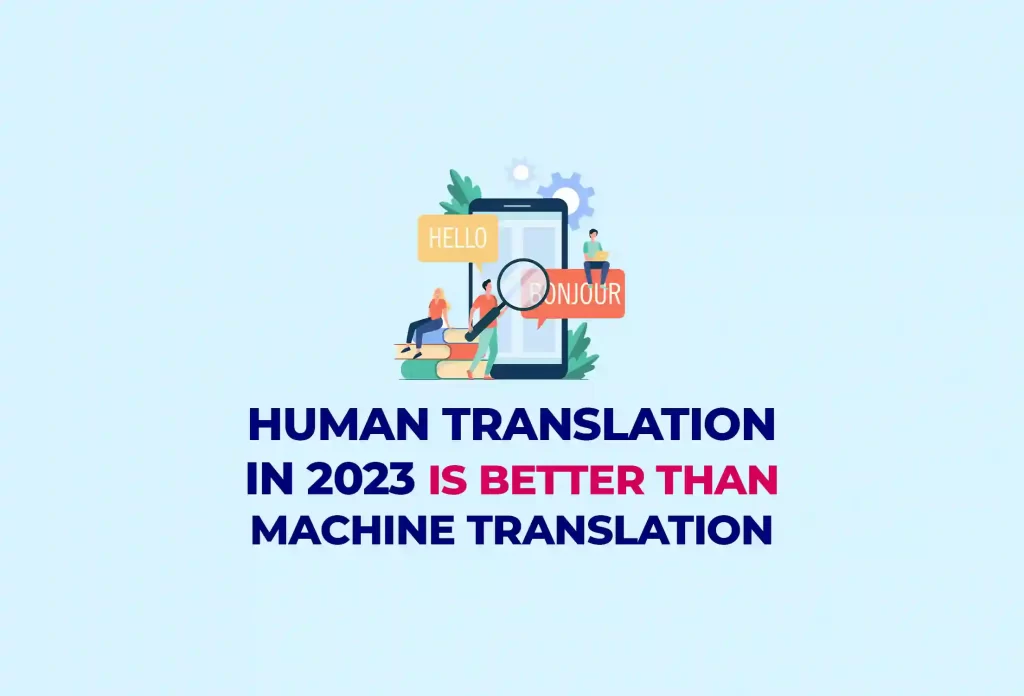Human Translation in 2023 is Better than Machine Translation
The translation is the process of converting text or speech from one language to another. With the world becoming increasingly globalized, the demand for translation services has grown exponentially. In the past, translation was done mainly by human translators, but with the advent of technology, machine translation has become increasingly prevalent. In recent years, machine translation has improved significantly, but it is still not as accurate as human translation. In this article, we will explore why human translation in 2023 is better than machine translation.
-
Human Translation vs. Machine Translation
Human translation involves a person translating text or speech from one language to another. Machine translation, on the other hand, involves a computer program translating text or speech from one language to another. While machine translation is faster and more cost-effective, human translation is still superior in terms of accuracy and nuance.
-
The Importance of Accuracy
Accuracy is crucial when it comes to translation. Even a small error in translation can completely change the meaning of a sentence or paragraph. Machine translation is still not able to pick up on nuances and context, which can result in mistranslations. Human translators, on the other hand, are able to understand the context and nuances of a text and are better equipped to provide accurate translations.
-
The Role of Context in Translation
Context is essential in translation, and it is something that machines still struggle with. A machine can translate individual words accurately, but it cannot always understand the context in which those words are being used. Human translators, on the other hand, are able to understand the context of a text and are therefore able to provide translations that are more accurate and meaningful.
-
The Importance of Nuance
Nuance is another crucial aspect of translation that machines struggle with. Language is complex, and there are often subtle differences in meaning that can be difficult for a machine to pick up on. Human translators, on the other hand, are able to understand these nuances and can provide translations that are more nuanced and accurate.
-
Cultural Understanding
Translation is not just about converting words from one language to another; it also involves understanding the culture and context in which the text was written. A machine does not have the cultural understanding required to provide accurate translations. Human translators, on the other hand, are able to understand the cultural nuances of a text, and can provide translations that are more culturally appropriate.
-
Machine Translation Still Has Limitations
Despite significant advancements in machine translation technology, there are still limitations to what machines can do. For example, machines are still not able to pick up on sarcasm or irony, which can be a problem when translating certain types of texts. Additionally, machines are still not able to provide translations that are as nuanced as those provided by human translators.
-
The Role of Translation Agencies
Translation agencies play a crucial role in the translation industry. They provide professional translation services for businesses and individuals and help to ensure that translations are accurate and culturally appropriate. In India, there are several translation agencies that specialize in providing translation services in Indian languages.
-
The Benefits of Using a Translation Company
Using a translation company has several benefits. Firstly, it ensures that translations are accurate and culturally appropriate. Secondly, it saves time and resources, as the company takes care of the entire translation process. Finally, it provides peace of mind, as businesses and individuals can be confident that their translations are of high quality.
-
The Future of Translation
While machine translation has improved significantly in recent years, it is unlikely that it will completely replace human translation. There will always be a need for human translators, particularly when it comes to translating complex texts or texts that require a high degree of accuracy and nuance.
-
Conclusion
In conclusion, while machine translation has come a long way in recent years, human translation in 2023 is still superior in terms of accuracy, nuance, and cultural understanding. While machines can provide quick and cost-effective translations, they still have limitations when it comes to understanding context, nuances, and cultural differences. As such, businesses and individuals should consider using professional translation services from a reputable translation agency to ensure that their translations are of high quality.
The translation industry is constantly evolving, and it is likely that technology will continue to play a significant role in the future of translation. However, it is important to remember that machines will never completely replace human translators. The ability to understand cultural nuances and provide accurate translations requires human intelligence and expertise, something that machines still cannot replicate.
In conclusion, while machine translation has its place in the translation industry, human translation in 2023 is still the superior option. By using professional translation services from a reputable translation agency, businesses, and individuals can ensure that their translations are accurate, culturally appropriate, and of the highest quality.
